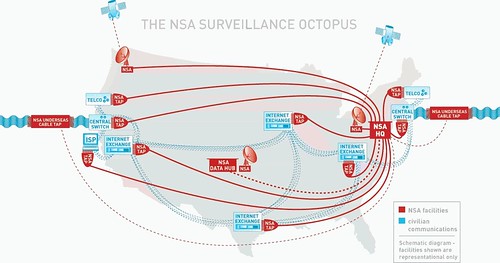
National Security Agency octupus conducts widespread surveillance of people in the United States and around the world. The US Senate recently gave broader authority to the state to carry out spying., a photo by Pan-African News Wire File Photos on Flickr.
Snowden leak shows the weakness of oversight
Our view: NSA whistleblower's revelations of disturbing but apparently legal surveillance suggest those who watch over America's secrets need watching themselves
5:30 PM EDT, June 10, 2013
The 29-year-old former CIA employee who admitted over the weekend to leaking documents about the National Security Agency's targeting of phone records, email accounts and Internet use of millions of Americans exemplified the ethical dilemma facing those who consider themselves government whistleblowers: They may firmly believe their fellow citizens have a right to know what the government is doing in their name, but if everyone with access to sensitive information felt justified in betraying the secrets entrusted to them, the government couldn't function.
Edward Snowden, the former Maryland resident who recently fled to Hong Kong from his job in Hawaii with government contractor Booz Allen Hamilton, said he leaked the documents in order to alert Americans to the extent of the nation's intelligence agencies' reach into their private lives. The materials he provided documented the existence of a massive electronic surveillance program that appears to have operated for years in near-total secrecy with minimal congressional oversight.
Whether the programs he exposed are truly necessary to safeguard national security and whether they indeed represent a dangerous breach of Americans' privacy are now subjects of heated debate. But it is certainly true that the American public had no idea that such surveillance was being conducted, and it is also clear that those few members of Congress who did know considered it largely unremarkable. That disconnect suggests that those charged with watching over America's secret intelligence agencies may need watching themselves.
Earlier news reports had detailed the rise of a vast national security apparatus composed of dozens of government agencies and hundreds of private contractors since the terrorist attacks of 2001. According to an investigation by The Washington Post, the public and private entities that constitute what is known as "the intelligence community" collectively employ some 850,000 people with top-secret security clearances spread across the country and around the globe. Mr. Snowden says he was driven to act as he did because of his belief that the power and influence of this virtual state-within-a-state is so all-pervasive that ultimately it is beyond the control of any single individual and is accountable to no one.
Congress' reaction to Mr. Snowden's revelations has hardly been reassuring. Knowledge of the NSA's surveillance has been confined for years to a handful of legislative leaders charged with overseeing intelligence matters, who apparently had few misgivings about the agency's activities — or at least not enough to publicly question what was going on. Like many Americans, they seem to have tacitly accepted President Barack Obama's argument last week that the government is justified in invading citizens' privacy in order to keep the country safe and that the agency's data-collection program violated no laws.
That may be true as far as it goes — the special court set up to oversee secret intelligence programs seems to have been willing to go along with whatever the agency requested in the name of national security — but it also suggests that that the civilians responsible for monitoring such programs have been captured by the agencies they are supposed to oversee. In that respect they may differ little from the employees of government regulatory agencies who become so close to the industries they are supposed to be monitoring that they fail to protect the public interest. In this case the people watching over the nation's intelligence community clearly seem to have a different idea of what they're supposed to be doing than the rest of us.
That's why a more robust separation between the intelligence community and the lawmakers and judges charged with overseeing it is a necessity if the system of checks and balances in a democracy is to work. More frequent rotation of the senators and representatives on intelligence panels may be necessary, for example. As it is, most members of Congress aren't even privy to the details of intelligence community programs, despite the fact that they are ultimately responsible for funding the government agencies and contractors engaged in spying.
Mr. Snowden says he accepts the fact that he will likely be punished for revealing the existence of the NSA program, but unlike Bradley Manning, the former Army intelligence clerk currently on trial for giving classified material to the anti-secrecy website WikiLeaks, Mr. Snowden's unauthorized release of classified material appears to be narrowly targeted. When Mr. Snowden found specific information he thought the public should know, he revealed only enough to document the truth of his allegations and nothing more. Mr. Manning, by contrast, indiscriminately dumped hundreds of thousands of pages of documents, apparently with little regard for the consequences.
Mr. Snowden's relative restraint may not exactly make him a hero — he still violated the oath he took to guard his country's secrets — but it should serve as a mitigating factor if and when he is ever called to account for his act of civil disobedience.
No comments:
Post a Comment